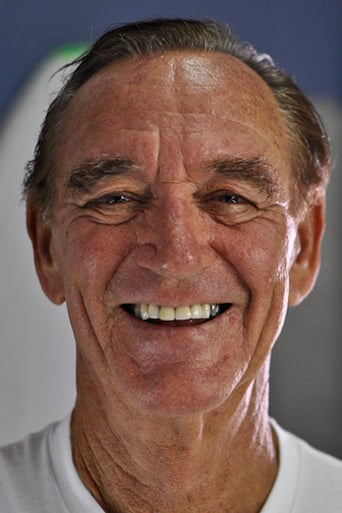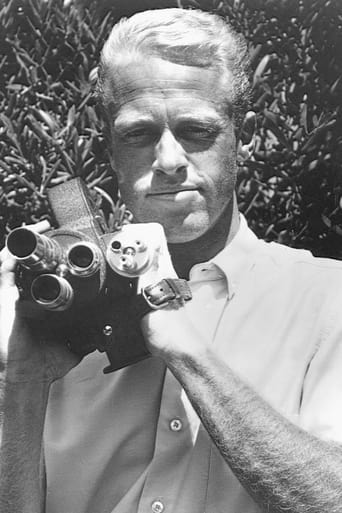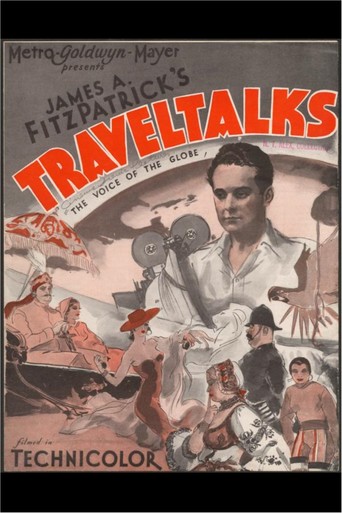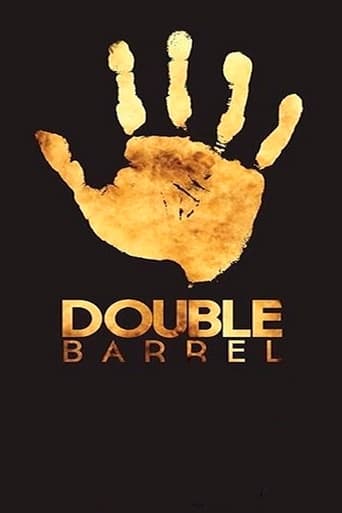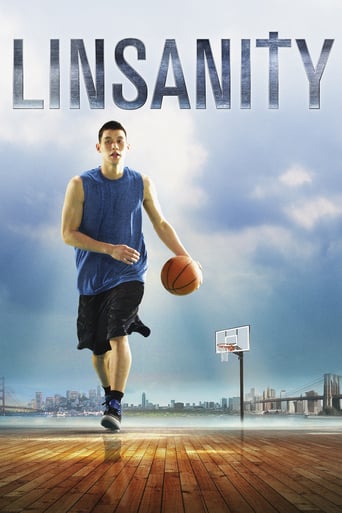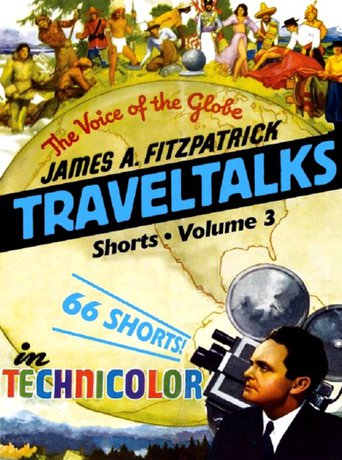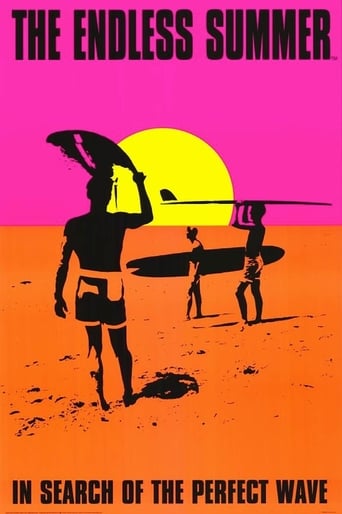
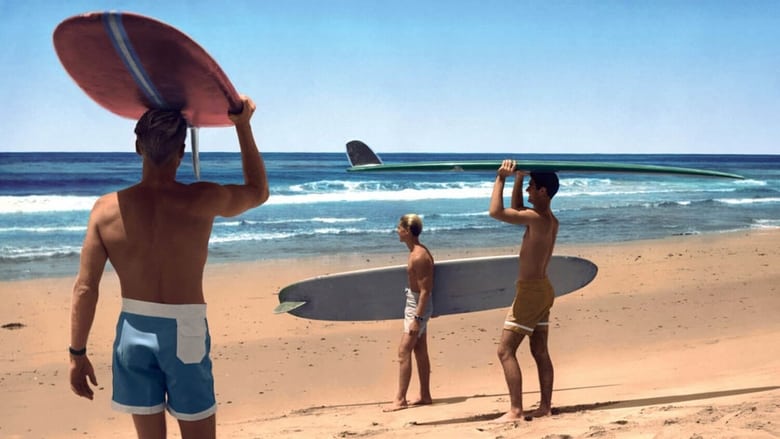
The Endless Summer (1966)
Bruce Brown's The Endless Summer is one of the first and most influential surf movies of all time. The film documents American surfers Mike Hynson and Robert August as they travel the world during California’s winter (which, back in 1965 was off-season for surfing) in search of the perfect wave and ultimately, an endless summer.
Watch Trailer
Cast


Similar titles
Reviews
Being something of a surfing enthusiast, myself, in my younger days (I've surfed in both Australia and Hawaii), The Endless Summer certainly turned out to be a very entertaining and enjoyable documentary, highlighting the thrills and excitement of this tres' exhilarating sport.From sunny Malibu Beach, California, to the uncharted waters of West Africa, to the shark-filled seas of Australia, to the tropical paradises of Tahiti and Hawaii, 2 young, American surfers accomplish in a few months what most people never do in a lifetime - They live their dream. And that dream for Mike and Robert is to find and ride the perfect wave.The Endless Summer is an imaginatively photographed travelogue, from the absolute height of surfing-mania in the mid-1960s, that thoughtfully captures the joy, danger and humor of searching the world for that ultimate, most perfect wave of all.Director Bruce Brown's whimsical narration in The Endless Summer gives the whole production a very comfortable, easy-going feeling that greatly contributes to its overall charm and appeal.
I recently saw this movie for the first time. I must admit I hadn't heard of it until I saw the poster at a local taco place. I'm usually not one for surfing movies, but I fell in love with it. It was refreshing to watch a documentary that was so well done, and without the use of special effects. Just a basic film camera and a couple of guys surfing the world. Bruce Brown's narration was spectacular, and the surfing was amazing.I think the best part was that the surfing was real. It wasn't done on a set with some green screen behind it. The people were actually out there on the waves.I will definitely watch this movie again.
The Endless Summer is probably my all-time favorite movie (I usually enjoy watching it with Endless Summer II & Endless Summer Revisited in one marathon session). The theme of two guys crossing the globe in search of the perfect wave is a classic. The raw, unrefined ("home movie-ish") surf footage makes you feel like you were there. The film itself is a snapshot of the early days of surfing and is a stark contrast to todays more polished sport. I particularly enjoy seeing the now famous surf spots before they were over-run and when surfers both feared & respected them. The surfing is great for the era, the humor is light if a bit corny, and the scenery is not to be missed. Buy this movie if you want to see what surfing was really like in 1966. Annette & Frankie are not here!
It's not just the mid-60's surfing scene time-capsule of a film that gives Bruce Brown's 'The Endless Summer' its timeless appeal. The film appeared just as jet travel was becoming commonplace, just as, for the first time in history, young people could afford to sojourn globally almost at will, so the world-circling quest of the movie's two surfers also captures the first movement by affluent youths to hitherto inaccessible lands. 'The Endless Summer' is thus not only a surfing film, in its time it was one of the many emerging spurs to today's so-called "eco-tourism." 'TES' is one of the most easygoing and pleasant films to watch - and to listen to in the form of Brown's laid-back California-accented (lots of very Round R's) narration - even though the narration is, at times, a trifle overly self-conscious it's never abrasive, insulting, or - one of the early two thousand-aughts' irritating "entertainment" prerequisites - "edgy." Younger viewers might feel baffled, or scornfully amused, by Brown's gingerly phrased admiration for an Australian woman's then-cutting-edge-scanty two-piece cozzie: the bikini in question is nowadays far from daring bathing attire. Youngsters accustomed to instant worldwide communications, and addicted to their I-Pods will also snicker at the teensy, ginsu transistor radio one of the travelling surfers packs in his suitcase. Of course the surfing gear is also antiquated - battleship-big boards sporting enormous skegs, for example, and no bungees tethering board to surfer. Also dating the film is Brown's genuine shock at the exorbitant cost of a Dakar hotel room and that establishment's price for a cup of coffee: thirty dollars a night, and a dollar a cup. Brown also speaks his horror at the high cost of petrol in Africa - almost a WHOLE DOLLAR for a gallon!: a comment made when gas cost Americans no more than 35¢ a gallon. Such then-shocking prices would scarcely provoke so much as a yawn from today's much more affluent (spoiled) and jaded teens who have, it seems, been lamentably misled to disbelieve that all of their world's problems are the fault of intrinsically avaricious and malevolent "dead white guys." Though the quaintness of Brown's laconic, good-natured narration dates 'TES,' as time marches on this quaintness also burnishes the film's appeal - it's just an endearing, lovely, wistful gaze at simpler, gentler halcyon days.'TES's' photography also remains pleasing - perhaps because Brown wasn't afraid to linger on, for one example, long establishing shots; and these lingering shots help greatly to communicate the film's overt and underlying soothing natural rhythms of the sea and the sky, and of our planet spinning for itself its cosmological alternations of night and day. The almost, but not quite, campy soundtrack music fits the period and subject perfectly - no Dick Dale frenetic here, just one surfer-filmmaker's enjoyably idiosyncratic blending of surfing music and scarcely updated travelogue scoring.I first saw 'TES' upon its 1966 theatrical release and, though I wasn't then and I've remained uninterested in surfing, it's a movie I can watch and enjoy regularly - perhaps because those lingering shots take me back to a time before gratuitous shock-schlock and instant-gratification became the be-alls and end-alls of today's so-called entertainment. 'TES' is, quite simply, pleasant and relaxing, and yet its rewarding and entertaining. In the spirit of its time, I recall feeling in the theatre during my first viewing of 'TES' that the film could have been about The Peace Corps if surfers had been allowed to serve in it as United States goodwill ambassadors.'TES's' latter-day sequels do not, and they never will, create the same warm wave of pleasure and joy and contentment that 'The Endless Summer' generated in, and propagated among, 1966's viewers. Because when it debuted there'd been no earlier film like it; and 'TES' ran for months in theatres, from beginning to end of that golden summer of '66 - a phenomenon unrepeatable in today's utterly profit-driven film industry.There you have it: 'The Endless Summer' wasn't a one-slam-dunk-weekend box-office blockbuster proposal on some market-study/focus-group-driven parent corporations' financial forecast: it was a labor of love, and when you see 'The Endless Summer' you feel the earnest, genuine, pure-hearted, virginal love that Bruce Brown poured into filming and editing it - love that you can't even come close to feeling from any of 'The Endless Summer's' imitators or sequels.


